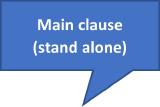10.5: El subjuntivo con verbos de voluntad e influencia
- Page ID
- 62651
The subjunctive with verbs of will and influence
Understanding different clauses
- Independent clause: A sentence or phrase that has a verb and can stand alone as a complete sentence. Ejemplo: Ustedes estudian español.
- Dependent clause: A phrase that has a verb but cannot stand alone as a complete sentence. Ejemplo: que ustedes estudien español.
- Complex sentence: has an independent clause (called the main clause) and a dependent clause (called the subordinate clause).
Ejemplos:


(1) [Estoy segura] [que mis amigos estudian español este semestre.]
I am sure that my friends study Spanish this semester.
(2) [Es bueno] [que mis amigos estudien español este semestre]
It's good that my friends study Spanish this semester.
Understanding tense and mood
We can find out when an action takes place in present, past or future through the verb tense used in a sentence. Therefore, the verb tense indicates when the action takes place.
Mood refers to a verb form that expresses attitudes towards events and actions. It expresses the speaker’s attitudes (such as wishes, hopes, desires, opinions, doubts, hypothetical and uncertainties) towards someone or something.
There are three moods in Spanish:
- Indicative mood – used to ask questions, make statements – objectively and factual/real information.
- Imperative mood – used to give commands (informal commands (tú), Nosotros commands, and formal commands (Ud. and Uds.))
- Subjunctive mood – used to express subjective attitudes of a speaker to someone or something else.
Like the indicative mood, the subjunctive mood has tenses. The present subjunctive views the actions that happen in the present tense through a “subjective” lens of a speaker’s attitudes and opinions. The examples in the chart below indicate the conjugated verb in bold. Moreover, the examples in present subjunctive indicate the expressions that trigger the subjunctive in bold.
|
Present Indicative |
Present Subjunctive |
|---|---|
|
Tú tomas tres clases. |
Tus padres desean que tú tomes tres clases. |
|
Ana busca un diccionario de español. |
Es importante que Ana busque un diccionario de español. |
|
Mis compañeros terminan su tarea. |
Ojalá que mis compañeros terminen su tarea. |
Verbs and phrases that trigger the subjunctive
In this lesson, we are going to learn and focus the uses of the present subjunctive using "trigger verbs" of will and influence; impersonal expressions and "ojalá" that trigger the use of the subjunctive.
Verbs of will and influence
| Spanish | English |
|---|---|
| aconsejar | to advise |
| desear | to wish, to desire |
| importar | to be important, to matter |
| insistir (en) | to insist (on) |
| mandar | to order |
| necesitar | to need |
| pedir (e: i) | to ask for |
| preferir (e: ie) | to prefer |
| querer (e: ie) | to want |
| recomendar (e: ie) | to recommend |
| rogar (o: ue) | to beg |
| sugerir (e: ie) | to suggest |
Impersonal expressions
| Spanish | English |
|---|---|
| Es bueno que... | It’s good that… |
| Es horrible que... | It's horrible that... |
| Es importante que... | It’s important that… |
| Es interesante que... | It's interesting that... |
| Es malo que... | It's bad that... |
| Es mejor que... | It's better that... |
| Es necesario que... | It's necessary that... |
| Es ridículo que... | It's ridiculous that... |
| Es terrible que... | It's terrible that... |
| Es urgente que... | It's urgent that... |
Other expressions
"Ojalá" – means (I wish, I hope) – is a word of Arabic origin meaning “May Allah grant”. The use of “que” is optional with "ojalá", but is used to point out that what follows “que” will be a dependent/subordinate clause.
Sentence Structure
Complex sentence: Sentence structure with subjunctive
Subject 1 + verb 1 (trigger verb, in present indicative) + que + subject 2 + verb 2 (in present subjunctive). "Trigger” verbs are shown in blue and the present subjunctive verbs (V2) are in bold.
|
[independent clause] [main clause: S1 + V1] |
(connector) que |
Dependent clause [subordinate clause: S2 + V2] |
|
|---|---|---|---|
| Tú quieres | que | yo vaya al cine contigo | |
|
Es bueno |
que |
estudiemos juntos en la biblioteca mañana. |
|
|
El profesor me sugiere |
que |
(yo) venga a su hora de oficina esta tarde. |
|
- Tú quieres que yo vaya al cine contigo.
You want that I go to the movies with you. - Es bueno que estudiemos juntos en la biblioteca mañana.
It’s good that we study together in the library tomorrow. - El profesor me sugiere que venga a su hora de oficina esta tarde.
The professor suggests to me that I come to his office hours this afternoon.
Complex sentence: Sentence structure with infinitive
In situations, where there is no use of “que” and there is no change in subject (only subject 1), we do not use subjunctive, but infinitive instead. "Trigger” verbs are shown in blue and the infinitive verbs (V2) are in bold.
Subject 1 + V1[conjugated in the Indicative mood] + V2
|
[independent clause] [main clause: S1 + V1] |
(no connector)
|
Dependent clause [ |
|
|---|---|---|---|
| Tú quieres | ir al cine conmigo este fin de semana. | ||
| Es bueno | estudiar en la biblioteca. | ||
| Marco necesita | venir a mi casa esta tarde. | ||
- Tú quieres ir al cine conmigo este fin de semana.
You want to go to the movies with me this weekend. - Es bueno estudiar en la biblioteca.
It’s good to study in the library. - Marco necesita venir a mi casa esta tarde.
Marcos needs to come to my house this afternoon.


